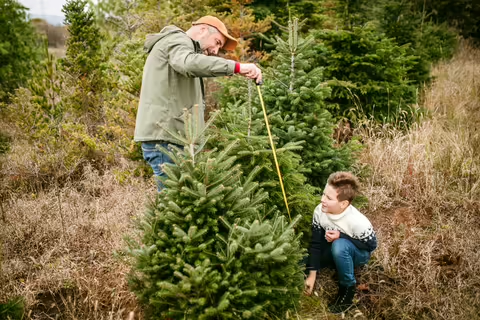URBANA, Ill. – From pre-lit artificial trees to potted living evergreens, the holidays have more tree options than ever, but for some only a visit to the tree lot or farm will do.
“Visiting a Christmas tree farm, garden center, or pop-up lot and choosing a real tree is a family tradition for many,” says Ron Wolford, a University of Illinois Extension horticulture educator. “Keeping that tree fresh throughout the holiday season is a lot easier with some pre-visit planning.”
The first step is to find the perfect spot. Pick a location away from heat sources, such as spaces heaters, fireplaces, TVs, radiators, and air vents to avoid drying out the tree and creating a safety hazard.
Next, measure the height and width of the space in the room where the tree will be placed.
“There is nothing worse than bringing a tree indoors only to find it's too tall,” Wolford says. “Take a tape measure with you to the farm or the tree lot.”
If the tree will be displayed in front of a large window, choose one that looks as good as possible from all angles. If the tree is against a wall, a tree with three good sides is a great option, while a tree with two good sides would work well in a corner.
“Keep in mind, the more picture-perfect a tree is, the more expensive it will be,” Wolford says.
When choosing a tree, look for a healthy green specimen with few browning needles. The needles should be flexible and not fall off easily. Raise the tree a few inches off the ground and drop it on the trunk end. It is normal for a few inner brown needles to fall, but very few green needles should drop off the tree.
Make sure the trunk or base of the tree is straight and long enough so that it will fit easily into the stand after making additional trunk cuts.
When buying a tree from a retail lot, Wolford recommends going during the day to get a better view.
“If you’re not putting it up right away, store the tree in an unheated garage or some other area out of the wind,” Wolford says. “Make a fresh 1-inch cut on the end and place the tree in a bucket of warm water.”
Before moving the tree indoors, check for any bird nests or insect egg masses. Cut another 1-inch slice off the stump and place the tree in a sturdy stand with water. Commercially prepared mixes, sugar, aspirin, or other water additives are not necessary.
“Research has shown that plain water will keep a tree fresh,” Wolford says.
The stand’s water reservoir should provide one quart of water for every inch of trunk diameter. Keep the water level several inches above the cut. If the base dries out, resin will cover the cut preventing the tree from absorbing water.
After the holidays, consider rehoming the tree. Many communities offer a recycling program, with trees going on to provide habitat for wildlife, enrichment for zoo animals, or to create erosion barriers.
For more information about trees selection and care, visit go.illinois.edu/ChristmasTreeCare.
SOURCE: Ron Wolford, Horticulture Educator, Illinois Extension
WRITER: Emily Steele, Media Communications Coordinator
ABOUT EXTENSION: Illinois Extension leads public outreach for University of Illinois by translating research into action plans that allow Illinois families, businesses, and community leaders to solve problems, make informed decisions, and adapt to changes and opportunities.
PHOTO ACCESS: The photo in this article is available to download for media use.
